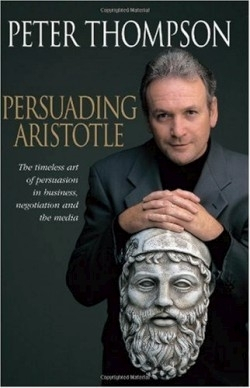Persuading Aristotle
The Timeless Art of Persuasion in Business Negotiation and the Media
Because speaking before an audience is only slightly less painful for most people than death, there is always room for a book that provides sensible guidance for the public speaking-challenged. Persuading Aristotle goes back, way back, to the fundamentals of rhetoric by reiterating the principles developed more than 2,400 years ago by Aristotle and his devotees. Says Thompson, “The way we think and persuade today owes everything to the insights of Aristotle and his contemporaries. We are under the influence of Aristotle every time we turn on the television. Advertisers organize the text of their thirty-second commercials on the basis of the structures taught at Aristotle’s Lyceum.”
Fortunately, for those of us who are a little vague on the principles of classical rhetoric, the author reviews Aristotle’s teachings in the first half of the book, specifically the five principles of persuasion—invention, arrangement, style, memory and delivery. But don’t panic: Thompson, host of ABC Radio National’s breakfast program, ties these principles into the world of business and shares examples of how this framework is used in everyday situations, including a sample coffee advertisement and a persuasive political speech. He goes on to discuss the further art of artistic persuasion, or incorporating ethos, logos and pathos (character, logic and passion) in persuasive speaking.
Two frameworks, also developed by Aristotle, help organize presentations or speeches into logical order, namely the five-point plan and the four-part story. Thompson discusses each of these frameworks thoroughly and provides real-life examples of how these can be put to use. He then argues persuasively on the need to punch up the dialogue in political and business speaking, most specifically through the use of metaphor. As an example, Thompson points to the terms used throughout the 1980s in the boardrooms and newspapers of the day, such as “masters of the universe,” “white knights,” “corporate raiders” and “golden parachutes,” all carefully designed to evoke images of war. After he fully explains and illustrates these underlying rhetorical principles, Thompson then goes on to give specific strategies and advice in the book’s remaining chapters, one each devoted to effectively handling business presentations, negotiations and media presentations.
Because Thompson hails from Australia, some of his examples from business down under may disconcert American readers. Otherwise, Persuading Aristotle makes a strong case for getting back to the basics when preparing a business presentation, negotiating to purchase a car or speaking to the media.
Reviewed by
Vicki Gervickas
Disclosure: This article is not an endorsement, but a review. The publisher of this book provided free copies of the book to have their book reviewed by a professional reviewer. No fee was paid by the publisher for this review. Foreword Reviews only recommends books that we love. Foreword Magazine, Inc. is disclosing this in accordance with the Federal Trade Commission’s 16 CFR, Part 255.

